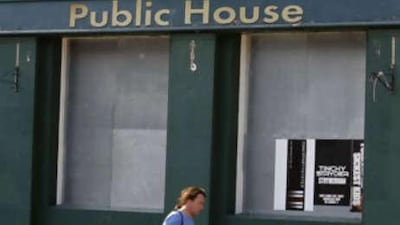LONDON // Time is being called at hundreds of pubs across Britain as beer sales slump to their lowest level since the Great Depression in the 1930s. On average, four pubs a day shut their doors for good last year in a country where the local tavern has been an integral part - essential part, some might say - of social, cultural and business life for centuries. But in the past 40 years, stricter drink-driving laws and changing drinking habits have resulted in the closing of thousands of country pubs. Camra, an organisation dedicated to promoting traditional ales, says that half the villages in Britain are now without one.
Suddenly, though, favourite watering holes in towns and cities are being driven out of business, too, and most of the blame is being attributed to the government's smoking ban that came into effect in England and Wales last year and, in Scotland, the year before. It was the main reason why 1.6 million fewer pints a day were pulled by pub landlords last year compared with the year before. That means that "only" 14 million pints are being served to bibulous patrons of the country's 57,000 remaining pubs - one-third less than at the height of the market 30 years ago. And latest figures show that, in 2008, there is likely to be a fall of a further 10 per cent in pub beer sales.
"The smoking ban could be the final nail in the coffin for thousands of British pubs," complained a landlord of a 16th century pub in a Sussex village. "People are buying cheap beer from supermarkets and drinking it at home. The economic downturn hasn't helped either. "If it weren't for the food trade, I would go out of business tomorrow. As it is, it is an enormous struggle, and God knows how we're going to get through the quiet winter months.
"The fact is that, in recent years, the British seem to have lost the pub culture - instead of popping down to the local for a pint or two, people are much more prone these [days] to slump in front of the telly all evening with a can of lager or glass of wine." Supermarkets, which often sell beer at prices that are lower than those that independent pub owners have to pay their wholesalers, have emerged as the big winners with beer sales at the checkouts showing a steady yearly increase.
Changing tastes have also resulted in Britons switching to cider, spirits and, especially, wine as their favourite alcoholic beverage. Rob Hayward, the chief executive of the British Beer and Pub Association, said: "Beer sales in pubs are now at their lowest level since the Great Depression. Beer sales are on the slide, and the tax increase in the [federal] budget has made it worse. "This is hitting Britain's brewers and pubs hard. It's also creating a large hole in the chancellor's pocket with the treasury's tax take also down. We need a change of approach from the government. Brewing is a major industry, beer our national drink, and pubs a treasured part of our national culture."
In a bid to boost sales, the pub trade has abandoned a voluntary code it promised to adopt to reduce binge drinking by ending happy hours and promotions of cheap drink. This has not pleased health campaigners, alcohol concern groups or the Association of Chief Police Officers, which wants more to be done by the drinks industry to curb excessive and dangerous drinking. "Sadly, the trade repeatedly shows that it cannot be relied upon to consistently act in a responsible way," said a spokesman for the association.
@Email:dsapsted@thenational.ae

